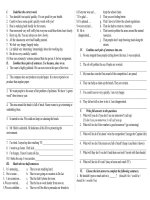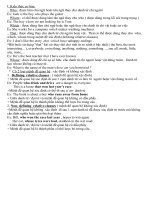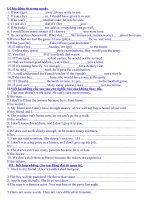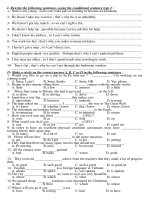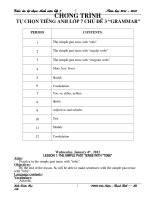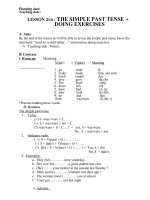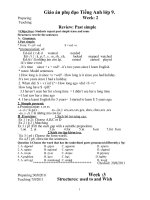Day them Tieng Anh 9
Bạn đang xem bản rút gọn của tài liệu. Xem và tải ngay bản đầy đủ của tài liệu tại đây (115.86 KB, 15 trang )
<span class='text_page_counter'>(1)</span>Teaching date: 24/8/2009 Unit 1: Grammar How to use tenses in English. 1. The present perfect tense. a. Form: S + have/ has + P2/V3 b. Usage: - Diễn tả một hành động vừa mới xảy ra, và mới kết thúc, thờng đi với trạng từ "just" Ex: The concert has just begun. - Diễn đạt một hành động bắt đầu từ quá khứ, còn kéo dài đến hiện tại và có khả năng tiÕp tôc ë t¬ng lai. Ex: Lan has lived in this house for 10 years. - Hành động xảy ra trong quả khứ mà không biết rõ thời gian. Ex: She has gone to HN. - Một hành động đợc lặp đi, lặp lại nhiều lần trong quá khứ. Ex: Ha has read that novel several times. c. C¸c phã tõ thêng ®i kÌm víi th× hiÖn t¹i hoµn thµnh. + just, recently, lately + since/ for + never + so far = unti now, up to now, up to the present. + already + yet I. Supply the correct verb forms. 1. I'm very busy at the moment. I (decorate) the sitting room. 2. I always (buy) lottery but I never (win) anything. 3. I (get) it in a car accident two days ago. 4. She (teach) English at ML school for 8 years. 5. I never (forget) what you (just tell) me 6. Long (work) at U so far. 7. My teacher wasn't at home when we (arrive). He (just go) out. 8. My father (not smoke) for 5 years. 9. People (speak) E all over the world. 10. Where are you, Nam? - I'm upstairs. I (have) a bath. 11. Some one (cut) down all the trees in the garden. 12. Listen! The birds (sing) 13. Mr. Nam (buy) that motorbike since last September. 14. Manh (watch) a film on TV at 8 last night. 15. Some animals (not eat) during winter. 16. Be quiet! The teacher (be) angry. 17. The birds (build) their nests when Spring (come) 18. My parents (give) me a new bike on my next birthday. 19. Why didn't you listen while I (speak) to you? 20. Up to now, the teacher (give) us 5 tests.. 1. am decorating 2. buy/ win 3. got 4. has taught 5. forget/ have just told 6. has worked 7. arrived/ has just gone 8. hasn't smoked 9. speak 10. am having 11. are cutting 12. are singing 13. has bought 14. was watching 15. don't eat 16. is 17. build/ comes 18. will give 19. was speaking 20. has given. II. Passive voice 1. Passive voice with tenses. a. Form: Be + P2/ V3 b. Usage: - Xác định thì trong câu chủ động. - Xác định tân ngữ trong câu bị động. - Chuyển tân ngữ trong câu chủ động thành chủ ngữ trong câu bị động và ngợc lại. - Nếu muốn nhấn mạnh chủ thể gây ra hành động, chúng ta dùng "by" cho ngời và dïng"with" cho vËt..
<span class='text_page_counter'>(2)</span> Ex: The letter was written by him The room is filled with smoke. 2. Passive with modal verbs a. Form: Modal verbs + be + P2/ V3. Ex: She can sing an English song - An E song can be sung by her. III. Practice I. Change the following sentences into passive voice. 1. Mark Twain wrote "Life on the Mississipi" 2. People must repair that old building 3. My aunt made this sweater for her son. 4. Lan is going to invite him to her birthday party. 5. Who invented the telephone? 6. I think you should send this letter this afternoon. 7. The police has just caught the thief 8. She teaches us grammar and writing. 9. Phong has to return the scientific book to the library. 10. Farmers grow rice in Viet Nam. 11. Lan gave her mother a new scarf on her 45th birthday last week 12. No one has cleaned that room for ages. 13. Lien couldn't open the door of the classroom. 14. My father is going to build the cage for the dogs. 15. My sister was playing chess with her friend when the phone rang. 16. The government will rebuild the Memorial Monument. 17. The students are discussing about their new plan. 18. Minh is feeding the chicken. 19. The teacher won't accept papers written in pencils. 20. They have to complete the new high way from north to south in this month. II. Rewrite the following sentences into active form. 1. This shirt was made from Hong Kong. 2. She might be interviewed by the principal. 3. The flights have been canceled because of the bad weather. 4. The crop can be damaged by the constant heavy rain. 5. The hospital is going to be rebuilt at the end of this month. 6. The Taj Mahal was designed by a Turkish architect. 7. Fruit must be kept in the fridge for long. 8. Her books were left on the table in the library. 9. The streets are swept everyday by these men.. 1. "Life on the Mississipi" was written 2. That old building must be repaired 3. This sweater was made 4. He is going to be invited…. 5. By whom was the telephone invented? 6. I think this letter should be sent ……… 7. The thief has just been caught…. 8. We are taught grammar… 9. The scientific book has to be returned to …. 10. Rice is grown … 11. Her mother was given 12. That roo hasn't been cleaned 13. The door of the classroom couldn't be opened… 14. The cage is going to be built for the dogs. 15. Chess was being played …. 16. The Memorial Monument will be rebuilt … 17. Their new plan is being discussed … 18. The chicken are being fed … 19. Papers won't be accepted to be written in pencils. 20.The new high way has to be completed ….. 1. They made this shirt from Hong Kong. 2. The principal might interview her. 3. They have canceled the flights because of the bad weather. 4. The constant heavy rain can damage the crop. 5. The government is going to rebuild the hospital at the end of this month. 6. A Turkish architect designed the Taj Mahal. 7. We must keep the fruit in the.
<span class='text_page_counter'>(3)</span> 10. The film "Titanic" has been shown on TV several times.. fridge for long. 8. She left her books on the table in the library. 9. These men sweep the streets everyday 10. They have shown the film "Titanic" on TV several times.. ……………………………………………………………………… Teaching date: 31/8/2009 Unit 2: Prepositions. I. Giới từ là những từ đợc ding với danh từ (hoặc đại từ, danh động từ) để chỉ sự liên hệ gi÷a c¸c tõ Êy víi c¸c tõ kh¸c trong c©u. Ex: The book is on the table. - Giới từ "on" để diễn tả sự liên hệ giữa danh từ " book" và danh từ "table". II. The use of the prepositions. 1. At: - For time - at 2 o'clock - at night - at Christmas, at Easter… - at once - at present… - For place - at home - at the theatre. - at school - at the shop - at the top… 2. In: - For time - in 2006 - in June - in the morning. - in time - in Spring - For place - in the living room - in the box… "In" đợc ding trớc các thành phố, đất nớc, miền, phơng hớng.,. - in Viet nam - in the east… 3. On: - For time - on Sunday - on time - on May 21st… - For place - on TV - on foot - on the table 4. By: - By dùng trong câu bị động. - The letter was written by her. - Dïng chØ ph¬ng tiÖn ®i l¹i - I often go school by bus..
<span class='text_page_counter'>(4)</span> 5. Into: - Có nghĩa là vào trong, đợc dùng sau các động từ: go, put, get, fall, jump. come… - I'm going into the dining room. - He fell into the river yesterday - Dùng để chỉ sự thay đổi của điều kiện hoặc kết quả. - The rain changed into snow. - Come into my house. 6. Out of: - He came out of the house - He was looking out of the window. 7. With: - Cã nghÜa lµ cã, mang cïng. - a coat with two pockets - a girl with blue eyes - Dùng để chỉ một công cụ, phơng tiện. - I often write with a pen - Dùng để chỉ sự liên hệ - Is there any one with you or alone? - I'm living with my uncle and aunt in HN. - Cßn cã nghÜa víi. - Do you agree with me? - Be patient with them. 8. Under: - Cã nghÜa lµ díi, chØ vÞ trÝ phÝa díi mét vËt - The cat is under the table. - She hid the novel under the pillow so that her mother wouldn't see it. - Cßn cã nghÜa Ýt h¬n, thÊp h¬n. - Children under fourteen years of age shouldn't see such a film. - The incomes under 1.500.000 a month made me poor. Exercise 1: Fill in the missing prepositions Answer 1. I shall meet you ……….. the corner ……….. the street. 2. I always come ……… school ……….. foot. 1. at/ of 3. It never snows here ………. Christmas. 2. to/ on 4. I live ……….. the country, but she lives …….. the seaside. 3. at 5. He always comes ………… bus. 4. in/ at 6. He learn the whole poem ………. heart. 5. by 7. Lan's birthday is ………. August 12th. 6. by 8. He never comes ………….. for the class. 7. on 9. He was standing ………….. the middle of the room. 8. in/ on 10. I shall see her ……… the beginning of the week. 9. in 11. …………. my opinion, it was very good book. 10. at 12. I waited for half an hour, and ……… last she came. 11. in 13. You will be accustomed ……….. English cooking. 12. at 14. She is angry ………… me 13. to 15. The dog begged ………… a piece of cake. 14. with 16. Does this watch belong ……… you? 15. for 17. She always borrows money ………. me. 16. to 18. I'll pick you ………. at the airport. 17. from 19. Are you interested …….. literature? 18. up 20. She is good ……….. English and math. 19. in 20. at. Exercise II. Choose the correct preposition to complete each sentence.. Answer 1. on.
<span class='text_page_counter'>(5)</span> 1. Each of us wants to have a picnic ……….. the mountain. (on/ up/ at/ of) 2. I think I have a lot ……….. things to do. (for/ about/ of/ in) 3. Mr. Parker grows maize ……. his farm. (at/ on/ to/ in) 4. After visiting Mr. Parker's farm, Van was able to learn a lot ……… the life on a farm.(of/ about/ with/ to) 5. Lan works part-time …………. a grocery store in a nearby town. (in/ into/ at/ on) 6. Nam's farm is about 100 km ………… Columbus. (from/ into/ about/ of) 7. We are now getting everything ready ………. the holidays. (about/ with/ toward/ for) 8. Van will be moving to a new address …………. the end of September. (at/ on/ to/ of) III. Match a word in A with its meaning or equivalent in B. A B 1. entrance a. bring things together. 2. reach b. where people buy food and small things. 3. highway c. give food to eat 4. route d. corn 5. maize e. shorter or less than standard time. 6. grocery store f. arrive at a place. 7. part-time g. main road 8. collect h. where you go into a place 9. feed i. way from a place to another. IV. Complete the following sentences. Dear Mom and Dad, 1. I/ arrive/ HN/ 5 o'clock yesterday morning. 2. I/ staying/ nice hotel/ not far/ city center. 3. I/ already see/ Uncle Ho's Mausoleum/ some places of interest here. 4. Tomorrow/ going on a trip/ Halong Bay. 5. I/ never been there before/ I'm excited/ trip/ not sleep. 6. I/ be home/ Sunday, Nov.10 7. I/ tell you/ more/ trip/ when/ be in Hue 8. I hope/ you well. With love, Mai.. 2. of 3. on 4. about 5. at 6. from 7. for 8. at. ……………………………………………………………………. Unit 3: Indirect statement. I. §Þnh nghÜa: - Lời nói trực tiếp là chính những từ do ngời nói dùng đợc lặp lại nguyên vẹn. - Lời nói gián tiếp hay lời tờng thuật là lời của ngời nói đợc lặp lại một cách gián tiếp víi mét ngêi kh¸c. II. Những sự thay đổi từ lời nói trực tiếp sang lời nói gián tiếp. - Đổi đại từ chỉ ngôi, đại từ phản thân, đại từ sở hữu và tính từ sở hữu..
<span class='text_page_counter'>(6)</span> + Ngôi thứ 1 thành ngôi thứ 3 (cùng một ngôi với chủ ngữ trong mệnh đề chính) + Ngôi thứ 2 cùng ngôi với tân ngữ trong mệnh đề chính. + Ngôi thứ 3 để nguyên lhông thay đổi. - Đổi thì của động từ. - Những từ chỉ những gì ở gần đợc đổi thành những từ chỉ những gì ở xa. III. C©u nãi gi¸n tiÕp: 1. Động từ tờng thuật ở thì hiện tại đơn, tơng lai. (to say, to tell, to declare, to inform, to think, to complain, to confess( Khi đổi sang lời nói gián tiếp, nếu động từ tờng thuật ở thì hiện tại đơn, hiện tại tiếp diễn, hiện tại hoàn thành, hoặc thì tơng lai thì chỉ thay đổi ngôi của đại từ chỉ ngôi, đại từ phản thân, đại từ sở hữu và tính từ sở hữu. Ex: - He says "I'm feeling ill" He says (that) he is feeling ill. - He has said "I was in Lon don yesterday" He has said he was …………. 2. Động từ tờng thuật ở thì quá khứ đơn: Khi động từ tờng thuật ở thì quá khứ đơn thì chúng ta phảit thay đổi tất cả. Ex: - He said " I'm wring a letter" He said he was writing a letter. - Lan said "I broke this vase" Lan said she had broken that vase. Chú ý: Khi câu trực tiếp diễn tả một chân lý hay một hành động đợc lặp lại thờng xuyên thì động từ không đổi thành quá khứ. - He said " the earth moves round the sun" He said the earth moves round the sun. - She said "I get up at 7 o'clock every morning" She said she gets up ………………… IV. Practice: 1. He said to her that she Exercise 1: Change these sentences into directed was his friend. speech. 2. Lan said she didn't know 1. He said to her "You are my friend" … 2. Lan said " I don't know how to do this exercise" 3. Tim said Hai had 3. Tim said " Hai has finished studying his lesson" finished studying his 4. People say "The sun rises in the east" lesson. 5. Lan said "I must wash my hair at once" 4. People say the sun rises 6. "I won't go to school tomorrow" Nam said. in the east. 7. She said "You sing very nice, Manh" 5. Lan said she had to wash 8. They told "we are very tired because we have worked her hair at once. all day" 6. Nam said he wouldn't go 9. Mai said "I will take you to my house" to school the next day. 10. "Oanh came to see me yesterday" Lan said. 7. She said to Manh that he sang very nice. 8. They told they were very Exercise 2: Choose the right word in brackets to tired because they had complete each sentence. worked … 1. Our team won the game because we played very 9. Mai said to me she would ………. (good/ well) take me to her house. 2. I tried on the shoes and they fitted me ……… 10. Lan said Oanh had ( perfect/ perfectly) come to see her the day 3. He had an accident because he was driving too …… before. (fast/ fastly) 4. Tom drove …….. along the narrow road. (careful/.
<span class='text_page_counter'>(7)</span> carefully) 5. Do you usually feel …….. before examinations? (nervous/ nervously) 6. Her English is quite …….. (fluent/ fluently) 7. She fell and hurt herself ……. (bad/ badly) 8. You look ………..! Are you all right? (terrible/ terribly) 9. He looks at me ……… when I interrupted him. (angry/ angrily) 10. I always feel ………. when the sun is shining. (happy/ happily) Exercise 3: Choose the correct forms of the verbs in brackets. 1. My father used ….. a packet of cigarettes a day. (to smoke/ smoking) 2. Please stop ………. me questions! (to ask/ asking) 3. I'm used to …….. with the television on. (work/ working) 4. She hopes ……. a suitable job. (to have/ having) 5. He enjoys ……… up late on Sunday mornings. (to get/ getting) 6. My sister hates ………. the ironing. (to do/ doing) 7. You don't need ………. to the meeting. (to come/ coming) 8. Does she want ………. a singer? (to become/ becoming) 9. They are thinking of ……. to American. (to move/ moving) 10. It's very difficult ……… a decision. (to give/ giving). Ex 2: 1. well 2. perfectly 3. fast 4. carefully 5. nervous 6. fluent 7. fluent 8. terrible 9. angrily 10. happy Ex 3: 1. to smoke 2. asking 3. working 4. to have 5. getting 6. doing 7. to come 8. to become 9. moving 10. to give. ……………………………………………………………. Unit 3: Double comparative.
<span class='text_page_counter'>(8)</span> Phßng gd & ®t HËu léc. kiªm tra häc k× I n¨m häc 2005 - 2006 M«n: TiÕng Anh Líp 9 Thêi gian lµm bµi: 45 phót. I. Choose the best answer A, B, or C. 1. You worked hard last semester, …………………………you? A. weren’t B. did C. didn’t 2. I wish my father …………………… smoke everyday. A. doesn’t B. didn’t C. isn’t 3. She asked me where I …………………………… every Sunday. A. go B. went C. have gone 4. He used to ……………… for a living by taking the vegetables to the city. A. do B. make C. get 5. I went swimming ……………………… I was a child A. until B. when C. as 6. We’ll play tennis first……………………… we’ll have lunch. A. before B. then C. after II. Change these sentences into reported speech. 1. “I have breakfast in this restaurant” he said - ……………………………………………………….. 2. “Where are you studying now?” Mr Ba asked me - ………………………………………………………. 3. “We’ll spend our holiday in Sam Son” they said to me. - ……………………………………………………… 4. “Do you live here?” Mai asked her boy friend. - ……………………………………………………… III. Give the correct tense or form of the verbs in brackets. 1. I (write) to my pen pal for two years and we first (meet) each other last week. 2. Jeans (make) a long time ago, and now people (sell) them every corner of the world. 3. I Wish I (know) how to mend this cassette player. 4. I just (see) a movie on war. 5. Trung used to (write) to his friends, but now he (communicate) with them through the Internet. IV. Rewrite the following sentences but keep the same meaning. 1. Phong is fourteen years old and Lan is, too - Phong is the……………………………………………. 2. I’m sorry I can’t speak English well. - I wish ………………………………………………….. 3. American people made jeans hundreds years ago. - Jeans …………………………………………………… 4. Lan said she went to school on foot. - Lan said ……………………………………………….. V. Read the paragraph then answer true (T) or false (F). Coca-cola is enjoyed all over the world and it is sold in over one hundred and sixty countries. The drink was invented by Dr John Pemperton in Alanta, on 8 May 1886, but it was given the name coca-cola by his partner, Frank Robinson. In the first year, only nine drinks a day were sold. The business was bought by a man called Asa Candler in 1895, and the first factory was opened in Dallas, Texas, in 1895. Coca-cola is still made there nowadays. Billions of bottles and cans have been produced since 1895. Answer true (T) or false (F).
<span class='text_page_counter'>(9)</span> 1. Coca-cola is sold in sixty countries 2. Dr John gave the name Coca-cola 3. A. Candler bought the business in 1895 4. Coca- cola is no longer made nowadays Phßng gd & ®t HËu léc. ……………. ……………. …………….. …………….. kiªm tra häc k× I n¨m häc 2005 - 2006 M«n: TiÕng Anh Líp 9 Thêi gian lµm bµi: 45 phót. I. Choose the best answer A, B, or C. 1. You worked hard last semester, …………………………you? A. weren’t B. did C. didn’t 2. I wish my father …………………… smoke everyday. A. doesn’t B. didn’t C. isn’t 3. She asked me where I …………………………… every Sunday. A. go B. went C. have gone 4. He used to ……………… for a living by taking the vegetables to the city. A. do B. make C. get 5. I went swimming ……………………… I was a child A. until B. when C. as 6. We’ll play tennis first……………………… we’ll have lunch. A. before B. then C. after II. Change these sentences into reported speech. 1. “I have breakfast in this restaurant” he said - ……………………………………………………….. 2. “Where are you studying now?” Mr Ba asked me - ………………………………………………………. 3. “We’ll spend our holiday in Sam Son” they said to me. - ……………………………………………………… 4. “Do you live here?” Mai asked her boy friend. - ……………………………………………………… III. Give the correct tense or form of the verbs in brackets. 1. I (write) to my pen pal for two years and we first (meet) each other last week. 2. Jeans (make) a long time ago, and now people (sell) them every corner of the world. 3. I Wish I (know) how to mend this cassette player. 4. I just (see) a movie on war. 5. Trung used to (write) to his friends, but now he (communicate) with them through the Internet. IV. Rewrite the following sentences but keep the same meaning. 1. Phong is fourteen years old and Lan is, too - Phong is the……………………………………………. 2. I’m sorry I can’t speak English well. - I wish ………………………………………………….. 3. American people made jeans hundreds years ago. - Jeans …………………………………………………… 4. Lan said she went to school on foot. - Lan said ……………………………………………….. V. Read the paragraph then answer true (T) or false (F). Coca-cola is enjoyed all over the world and it is sold in over one hundred and sixty countries. The drink was invented by Dr John Pemperton in Alanta, on 8 May 1886, but it was given the name coca-cola by his partner, Frank Robinson. In the first year, only.
<span class='text_page_counter'>(10)</span> nine drinks a day were sold. The business was bought by a man called Asa Candler in 1895, and the first factory was opened in Dallas, Texas, in 1895. Coca-cola is still made there nowadays. Billions of bottles and cans have been produced since 1895. Answer true (T) or false (F) 1. Coca-cola is sold in sixty countries ……………. 2. Dr John gave the name Coca-cola ……………. 3. A. Candler bought the business in 1895 …………….. 4. Coca- cola is no longer made nowadays ……………. ………………………………………………………………………… Phßng gd hËu léc. đề khảo sát chất lợng cuối học kỳ I. N¨m häc: 2006 - 2007 M«n: TiÕng Anh - líp 9. đề chẵn I/.Choose the best answer. 1. Ben …………………me if I like pop music. A. asked B. told C. said D. talked 2. She asked me how I …………………English in the future. A. will use B. would use C. used D. use 3. The teacher hasn’t come, …………………? A. does she B. hasn’t she C. has she D. doesn’t she 4. Our train arrived in Ho Chi Minh City …………………6.30 p.m. A. on B. in C. for D. at 5. Nam wishes he …………………English well. A. speaks B. spoke C. will speak D. to speak II/ Write the correct verb forms. 1. The teacher asked me where I(live) 2. We (know) him for ten years. 3. I wish I (can) drive a car 4. My brother enjoys (play) soccer very much. 5. She (return) from holiday yesterday. III. Rewrite the following sentences but be sure that the meaning stays the same. 1. “Can you swim?” Ba asked me. - Ba asked me …………………..…..…… ……………………..…… 2. “Where do you live?” the man asked me. - The man asked …..…… ……………………..…… ………………… 3. “We’ll go camping this week” said Lan - Lan said …..…… ……………………..…… ………………… 4. Nga isn’t at home now. - I wish …..…… ……………………..…… ………………… 5. “I don’t like cartoons” Ba said - Ba said …..…… ……………………..…… ………………… IV. Find and correct mistakes in the following sentences. 1. I can’t play the piano but I wish I can 2. We haven’t gone to the movies since two months 3. She said that she would go Ha Noi tomorrow. 4. The train will be leaving after a few minutes. 5. I don’t enjoy to go the dentist. V/. Read the passage and answer T (true) or F (false) For centuries, poets, writers and musicians have mentioned the ao dai in poems, novels and songs. The ao dai is traditional dress of Vietnamese women. It consists of a long silk tunic that is slit on the sides and worn over loose pants. Traditionally, it was frequently worn by both men and women. Nowadays, women usually wear it, especially.
<span class='text_page_counter'>(11)</span> on special occasions. However, many Vietnamese women today often prefer to wear modern clothing at work, because it is more convenient. Answer true or false True/ False 1. The ao dai is traditional dress of Vietnamese women. …………… 2. Traditionally, it only worn by women. …………… 3. The dressing and material used for men were the same as those used foe women. …………… 4. Nowadays, Vietnamese women don’t wear the ao dai any more …………… 5. They prefer to wear modern clothing at work. ………… ……………………………………………………………………….. Phßng gd hËu léc. đề khảo sát chất lợng cuối học kỳ I. N¨m häc: 2006 - 2007 M«n: TiÕng Anh - líp 9. đề lẻ I/. Choose the best answer. 1. I’m going to Hue with him …………………Saturday A. on B. in C. at D. X 2. Lan …………………that she would go to the movies that night. A. asked B. told C. said D. says 3. I have learnt English …………………4 years. A. since B. for C. in D. after 4. They go to school by bus, …………………? A. don’t they B. do they C. will they D. did they 5. There is a meeting …………………at 9 a.m and 2 p.m today. A. between B. on C. till D. at II/. Write the correct verb forms 1. He used to (stay) up late when he was on holiday last summer. 2. They (live) in Ha Noi since 1999. 3. I wish you (visit) next summer 4. She likes (read) books in her free time. 5. I wish they (be) here tomorrow. III/. Rewrite the following sentences so that the meaning stays the same. 1. “Can you play the piano?” he asked Lan - He asked …..…… ……………………..…… ………………… 2. “I’m waiting for my parents now”, said Hoa - Hoa said …..…… ……………………..…… ………………… 3. “The English exam is easy”, he said - He said …..…… ……………………..…… ………………… 4. “What are you doing now?” Ba’s mother asked him - Ba’s mother asked him …..…… ……………………..…… ………………… 5. Nam has an old bike - Ba wishes …..…… ……………………..…… ………………… IV. Find and correct mistakes in the following sentences. 1. I wish I have more free time A B C D 2. They haven’t met her parents for last Christmas A B C D 3. He asked where Lan had gone yesterday. A B C D 4. On Saturday night, I went to bed on 11 o’clock A B C D.
<span class='text_page_counter'>(12)</span> 5. Nam dislikes to get up early in the morning. A B C D V/. Read the passage and answer T (true) or F (false) For centuries, poets, writers and musicians have mentioned the ao dai in poems, novels and songs. The ao dai is traditional dress of Vietnamese women. It consists of a long silk tunic that is slit on the sides and worn over loose pants. Traditionally, it was frequently worn by both men and women. Nowadays, women usually wear it, especially on special occasions. However, many Vietnamese women today often prefer to wear modern clothing at work, because it is more convenient. Answer true or false True/ False 1. The ao dai is traditional dress of Vietnamese women. …………… 2. Traditionally, it only worn by women. …………… 3. The dressing and material used for men were the same as those used foe women. …………… 4. Nowadays, Vietnamese women don’t wear the ao dai any more …………… 5. They prefer to wear modern clothing at work. …………. Unit 6: Grammar focus. 1. Real conditional sentence If + S + V (at present), S + shall/ will/ can may/ might + Verb must should ought to Ex: If it is sunny tomorrow, we will go to the beach. We will catch the bus if we hurry We shall stay at home if it rains Ngoài liên từ if, mệnh đề phụ còn có thể bắt đầu bằng các liên từ sau: Unless = trõ phi, nÕu… kh«ng (= if ….. not) Ex: I'll fail the test unless I learn these words. (= If I don't learn) As long as = miÔn lµ, miÔn sao, víi ®iÒu kiÖn lµ) Ex: You can borrow my bicycle as long as you bring it back this evening. 2. CÊu tróc víi suggest: * Suggest + V - ing * Suggest (that) S + should + Verb Ex: I suggest joining them on the trip to the mountains. His mother suggests that he should marry. 3. Exercise: I. Write conditional sentences type 1 1. We (go out) later if it (stop) raining. 2. Do you want to watch? I (switch) it on if you (do) 3. If we (leave) now, we (not be) late. 4. If Tam (not apologize) to me, ( (not speak) to him anymore. 5. You (phone) me tomorrow if you (have) time? 6. If I (not be) too busy tomorrow, I (visit) you. 7. If you (not water) the tree every day, it (die) 8. If she (not pass) the exam, her parents (be) very worried. 9. I (drop) in to see him if I (finish) work before 5 p.m 10. If you (press) this key, the computer (start) without the usual beep. II. Use the word "unless" in place of "if … not".
<span class='text_page_counter'>(13)</span> 1. You can see the game if you haven't got a ticket. 2. If John doesn't apologize to me, I won't speak to him anymore. 3. If we don't leave now, we will be late. 4. We can't write to Q uang if he doesn't send us his address. 5. If the bus doesn't come soon, I'll have to walk home. 6. If no more guests come, we won't use the other room 7. If you don't read the instructions carefully, you won't know how to do the test. 8. If you don't study harder, you're going to fail the exam. 9. If he doesn't come, we will leave without him. 10. If you don't leave the key with the neighbor, we won't be able to enter the house. III. Write sentences using "suggest + gerund" 1. "Why don't we turn on the T.V for the football match?" I said - I suggest ………………………………………….. 2. He said to me "let's go out for a Chinese meal" - He suggested ………………………………….. 3. Let's go for a walk - Marry suggested ………………………………… 4. "Let's have a surprise party for Huong" Hoa said to the class. - Hoa suggested ……………………………………. 5. "I think we should close the windows to shut out the noise" - I suggested ……………………………………… 6. "Why don't we go fishing this weekend?" - Tam suggests ………………………………………… 7. "I think we should buy a modern for Internet connection" - I suggested ………………………………………… 8. "Why don't we discuss this problem at the next club meeting? - He suggested ……………………………………… 9. "We should cancel the picnic because of the nasty weather/" - Thanh suggests ………………………………….. 10. "Let's take a taxi to be sure of getting there on time" he said. - He suggested …………………………………………….. IV. Rewrite the sentences, using "suggest + that - clause" 1. If I were you, I'd get a hair cut. - My friend suggested …………………………………. 2. "Why don't you go to bed early?" my mother told me. - My mother suggests …………………………………… 3. "Why don't you stop working and take a rest?" - I suggest ………………………………………………. 4. My teacher said "If I were you, I'd do some more reading" - My teacher suggested ……………………………………. 5. I think it would be a good idea if you did your homework after dinner. - She suggested …………………………………………………… 6. She said to him "If I were you, I would eat more fruit and vegetables." - She suggested ………………………………….. 7. Don't use the photocopier without asking for permission. - I suggest …………………………………………. 8. Don't you think it is better for you to walk to school instead of riding your motorbike? - I suggest …………………………………………… 9. You'll enjoy the story more if you read the author's autobiography. - I suggest ………………………………………………. 10. Dress formally for the New Year's party. - I suggest ……………………………………………….. ……………………………………………………………………...
<span class='text_page_counter'>(14)</span> Unit 7: Grammar focus. A. Phrasal verbs Động từ kép đợc tạo thành bởi một động từ và một tiểu từ (particle). Tiểu từ này có thể là một giới từ (preposition) hoặc một trạng từ (adverb). Khi động từ kép cần có một tân ngữ thì tiểu từ là một giới từ. Khi động từ kép không cần có một tân ngữ thì tiểu từ là mét tr¹ng tõ. Ex: Please turn down the radio (down lµ giíi tõ) The price of petrol has gone down (down lµ tr¹ng tõ) §éng tõ kÐp r¬i vµo 2 nhãm: Ph©n li (seperable) vµ kh«ng ph©n li (non - seperable) 1. Nhóm phân li: Khi tân ngữ là danh từ hoặc đại từ, thì tân ngữ này có thể đứng sau tiÓu tõ, trõ phi ng÷ danh tõ qu¸ dµi. Ex: I gave the book back to him I gave it back Nhng: I gave the newly - published book to him vµ ta kh«ng thÓ nãi: I gave back it. 2. Nhóm không phân li: Tân ngữ, cho dù là danh từ hoặc đại từ, thì vẫn phải luôn đứng sau tiÓu tõ. Ex: She looks after her little brother. She looks after him Ta kh«ng thÓ nãi: He looks him after. B. Using the connectives. since, so, and, however, but, therefore, because, moreover, though, … C. Exercise I Multiple choice 1. Mr.Brown ……… his children to school every day a. drives b. brings c. takes d. picks 2. Mary works at a supermarket. She …….. $5 an hour a. pays b. brings c. takes d. earns 3. I bought the book ……….. 3 dollars in a second hand bookstore. a. with b. at c. for d. by 4. The boy looks a little bit thin, …………. he is strong a. and b. for c. or d. but 5. The police ……….. warned the people not to come home. a. hasn't had b. hasn't c. has d. have 6. The students have got ……… news about their exams a. many b. some c. a d. a few 7. I was ……… tired that I went to bed immediately. a. such b. so c. too d. very 8. We arrived ………. the station just in time to catch the train. a. in b. at c. to d. for 9. This book is different ………. the one I had. a. with b. of c. to d. from 10. No sooner had he sat down to lunch ………. there was a knock at the door. a. when b. that c. as d. than II. Using the connectives to combine the sentences. 1. He seems a friendly person, but I didn't like him. (however) 2. My computer wouldn't start. Thanh's started immediately. (but) 3. I turned up the radio in the living room. I could hear it in the kitchen. (so) 4. He lived in France for 10 years, but he never learned French. (though) 5. We sometimes stayed out late. We always got home before twelve. (though) 6. He doesn't like sport, he doesn't mind watching the football. (however) 7. It's a large city. You have to use the public transport a lot. (since) 8. Hung never helped with the housework. Tam did. (but).
<span class='text_page_counter'>(15)</span> 9. I didn't phone you. It was very late. (because) 10. The coffee was too strong for me. I didn't drink it. (so) III. Using and, but, so, then, before, after, because to complete the sentences. 1. I got out of the car ………. walked into the house. 2. The weather was lovely, ……… we stayed in the garden. 3. ………….. we went to bed, I locked all the doors. 4. The little boy was wet and cold, ………… he wasn’t hurt. 5. We turned off the lights ……… left the room. 6. I had a shower ……… we played football. 7. I sat in the kitchen ……… read a book. 8. She worked hard, ………….. failed all her exams. 9. It was very wet, ………. we didn't go out. 10. I had to walk to school ………. my bicycle was broken..
<span class='text_page_counter'>(16)</span>

